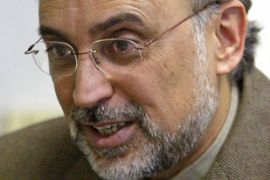UN rebuke ‘forced’ new Iran plans
Tehran says IAEA resolution prompted move to build 10 new nuclear facilities.

But Ali Larijani, Iran’s parliament speaker and former chief nuclear negotiator, said that negotiation was still possible over the programme, which he again insisted is meant only for civilian energy production
“I still think there is a diplomatic opportunity and it is beneficial to them [the world powers] to use this, so that Iran continues its work under the framework of the agency and international supervision,” Larijani said.
“They are free to choose the decision and Iran will act accordingly.”
Iranian anger
His comments came after the IAEA resolution demanded Iran halt the construction of a newly revealed enrichment facility near the city of Qom.
| in depth | |||||||||||||||||||||
|
For the first time China and Russia, two of Iran’s traditional allies, backed Friday’s resolution.
Iran disclosed the Qom plant in September, but said that it had not broken any IAEA regulations in not announcing the presence of the facility earlier, because there is not yet any nuclear material at the plant.
“Iranians did not expect the resolution by the IAEA. They are angry and much of what they are saying is a reaction to the decision,” Sadegh Zibakalam, a political science professor at Tehran university, said.
“The Iranian leaders are more angry with the Russian and Chinese leaders, rather than the Americans, British and French in the decision-making process. They did not expect Russia and China to go along in condemning Iran,” he told Al Jazeera.
“But over the next few days and weeks tempers will be calm and I don’t think Iran will go ahead with building more enrichment plants.”
Al Jazeera’s Alireza Ronaghi, reporting from Tehran, said Iran’s announcement to build the new nuclear sites was an attempt to document the government’s defiance against world powers on the nuclear issue.
“President Ahmadinejad has been under a lot of pressure internally even from his allies. They have been accusing his government of being too soft in front of Western powers,” he said.
“Right now, quite the opposite is happening and President Ahmadinejad is being praised by his supporters over his stance, which is very, very aggressive now.”
Parliament’s demands
Iranian MPs have demanded that the government of Mahmoud Ahmadinejad, Iran’s president, reduce co-operation with the IAEA in response to the resolution.
“We consider the behaviour of the IAEA to be that of double standards and political. We want it to give up this double standard which has tarnished its reputation,” the MPs said in a statement on Friday.
|
“Why announce 10 new enrichment sites when Iran doesn’t have a single nuclear power station to use the fuel?” Bernard Kouchner, French foreign minister |
But France on Monday called Iran’s response to the IAEA “ridiculous” and “childish”, and warned that such a stance could lead to the imposition of new UN sanctions.
“For Iran to continue to ignore the demands of a great independent agency like the International Atomic Energy Agency is very dangerous,” Bernard Kouchner, France’s foreign minister, told the daily Le Figaro newspaper.
“Why announce 10 new enrichment sites when Iran doesn’t have a single nuclear power station to use the fuel?”
In a separate interview on RTL radio, Kouchner said the announcement proved the Iranians were “making fools of themselves” with their “ridiculous” and “fairly childish” reaction, the AFP news agency reported.
Western powers, including the US, accuse Iran of covertly seeking to develop atomic weapons, which Tehran denies.
They have urged Iran to accept a UN brokered offer that would delay Iran’s ability to make a nuclear weapon as well as engage in broader talks with the ultimate goal of persuading it to stop its enrichment programme.
Iran has amassed about 1,500 kilogrammes of low-enriched uranium at Natanz but insists it is for civilian purposes.
The UN offer aims to convince Iran to hand over more than 1,200 kilogrammes, more than the commonly accepted amount needed to produce weapons-grade material.
Iran has rejected the UN terms for the plan.
